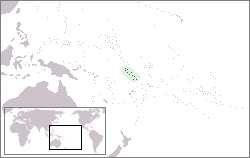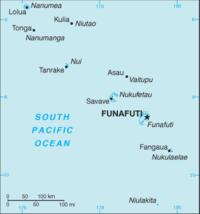Tuvalu
|
|

| |||||
| |||||
| National anthem | Tuvalu mo te Atua (Tuvaluan: "Eight Standing Together for the Almighty") | ||||
| Languages | Tuvaluan, English | ||||
| Capitals | Funafuti (atoll), Vaiaku (village; Gov.), Fongafale (village) | ||||
| Queen | Elizabeth II | ||||
| Governor-General | Filoimea Telito | ||||
| Prime Minister | Maatia Toafa | ||||
| Independence | From the U.K. October 1, 1978 | ||||
| Area – Total – % water | Ranked 190th 26 km² Negligible | ||||
| Population – Total – Density | Ranked 193rd 11,468 (July 2004 est.) 441/km² | ||||
| Currency | Tuvaluan dollar | ||||
| Time zone | UTC +12 | ||||
| Calling Code | 688 | ||||
| Internet TLD | .tv | ||||
Tuvalu is an island nation located in the Pacific Ocean midway between Hawaii and Australia. Its name means "Eight Standing Together" in Tuvaluan. With the exception of tiny Vatican City, it is the independent nation with the fewest inhabitants. Due to their low elevation (5 meters, or 14 feet maximum), the islands that make up this nation are threatened by any future sea level rise. The population may evacuate during the next decades to New Zealand, or Niue, a small Pacific island (independent but associated with New Zealand) that isn't threatened by sea level rise, but does have decreasing population.
| Contents |
History
Main article: History of Tuvalu
Tuvaluans are a Polynesian people who are estimated to have settled the islands around 2,000 years ago. During pre-contact times, there was frequent canoe voyaging between the nearer islands.
Tuvalu was first sighted by Europeans in 1568 with the arrival of Alvaro de Menda Neyra from Spain, who encountered the island of Nui but was unable to land. No other Europeans turned up again until the late 1700s, when further European explorers reached the area. By the early 1800s, whalers were in the Pacific, though visiting Tuvalu only infrequently due to the difficulties of landing ships on the atoll, and no settlements were established by them. Peruvian slave raiders ("blackbirders") combed the Pacific between 1862 and 1864 and Tuvalu was one of the hardest-hit Pacific island groups with over 400 people taken from Funafuti and Nukulaelae, none of whom returned. In 1865, the London Missionary Society, Protestant congregationalists, began their process of evangelization of Tuvalu, and conversion to Christianity was complete by the 1920s. Also in the late 1800s, European traders began to live on the islands hoping to profit from local resources. Europeans brought diseases new to the Pacific which caused many deaths in Tuvalu.
In 1892, the islands became part of the British protectorate of the Gilbert and Ellice Islands, with Tuvalu being called the Ellice Islands. The protectorate became a colony in 1915. In 1943 during World War II, Tuvalu was selected as an operations base for Allied forces battling the Japanese in the Pacific. Thousands of marines were stationed there until December 1945. In 1974, ethnic differences within the colony caused the Polynesians of the Ellice Islands to vote for separation from the Micronesians of the Gilbert Islands (later Kiribati). The following year, the Ellice Islands became the separate British colony of Tuvalu. Independence was granted in 1978. Tuvalu Independence Day is celebrated on the 1st of October.
Politics
Main article: Politics of Tuvalu
Tuvalu is a constitutional monarchy and Commonwealth Realm, with Queen Elizabeth II recognised as Queen of Tuvalu. She is represented in Tuvalu by a Governor-General, who is appointed upon the advice of the prime minister.
The local parliament, or Fale I Fono, has 15 members and is chosen every four years. Its members elect a prime minister, who is the head of government. Some elders also exercise informal authority on a local level.
Atolls, islands or districts
Main article: Islands of Tuvalu
Although Tuvalu technically has no administrative subdivisions - its population is too small (estimated at 11,000 in 2004) - the country can be divided into 9 atolls.
- Atolls consisting of more than one island
- Atolls consisting of only one island
The smallest island, Niulakita, was uninhabited until it was resettled by people from Niutao in 1949. Thus, the name Tuvalu means "eight standing together" in the Tuvaluan language.
Geography
Main article: Geography of Tuvalu
Being one of the smallest countries in the world, in fact, the fourth smallest, Tuvalu also has very poor lands. There is almost no potable water, and the soil is hardly usable for agriculture.
In 2001, Tuvalu's government announced that the islands, whose highest point is 5 m above sea level, may need to be evacuated in the event of rising sea levels. New Zealand has agreed to accept an annual quota of 75 evacuees, while Australia has refused the Tuvaluans' petitions, presumably based on that country's rejection of the underlying basis of the Kyoto Protocol.
Economy
Main article: Economy of Tuvalu
Tuvalu has almost no natural resources, and its main form of income consists of foreign aid. Main industries are fishing and tourism, even though, due to the remote location of the islands, only a small number of tourists arrive annually.
Government revenues largely come from the sale of stamps and coins and worker remittances. About 1,000 Tuvaluans work in Nauru in the phosphate mining industry. Nauru has begun repatriating Tuvaluans, however, as phosphate resources decline. Substantial income is received annually from an international trust fund established in 1987 by Australia, New Zealand, and the United Kingdom and supported also by Japan and South Korea. Thanks to wise investments and conservative withdrawals, this Fund grew from an initial $17 million to over $35 million in 1999. The US government is also a major revenue source for Tuvalu, with 1999 payments from a 1988 treaty on fisheries at about $9 million, a total which is expected to rise annually. In an effort to reduce its dependence on foreign aid, the government is pursuing public sector reforms, including privatization of some government functions and personnel cuts of up to 7%.
In 1998, Tuvalu began deriving revenue from use of its area code for "900" lines and from the sale of its ".tv" Internet domain name. In 2000, Tuvalu negotiated a contract leasing its Internet domain name ".tv" for $50 million in royalties over the next dozen years. Royalites from these new technology sources could raise GDP three or more times over the next decade.
Low-lying Tuvalu is particularly vulnerable to any rise in the sea level from future climate change. In mid-February 2004, unusually high tides caused seepage that transformed much of the interior into a salty lake, harming root crops.
The Tuvalu dollar, the local currency, is coupled to the Australian dollar.
Demographics
Main article: Demographics of Tuvalu
The small population of Tuvalu is almost entirely of Polynesian ethnicity. About 97% of the Tuvaluans are members of the Church of Tuvalu, a Protestant Christian church. The religion has been mixed with some elements of the indigenous religions.
The Tuvaluan language is spoken by virtually everyone, while I-Kiribati is spoken by some people on Nui. English is also an official language, but is not spoken in daily use.
The island population has more than doubled since 1980 and is estimated to have reached 11,000 by 2004. The population boom may be a contributing factor to the environmental devastation on the islands.
Culture
Main article: Culture of Tuvalu
The traditional community system still to a large extent survives on Tuvalu. Each family has its own task, or salanga, to perform for the community, such as fishing, house building or defence. The skills of a family are passed on from father to son.
Controversy over Climate Change
As a low lying island lacking a surrounding shallow shelf, the island communities of Tuvalu are especially susceptible to changes in sea level and storm patterns that hit the island undissipated. Over the past decade, the islands have seen a disappearance of 10 feet of beachfront and an increase in the severity and frequency of storms. Tuvaluans are worried about the submerging of the islands and a growing number have left the island. In 2002, then-Prime Minister Koloa Talake announced plans to sue the United States and Australia at the International Court of Justice in the Hague over their disproportionate production of carbon dioxide emissions. The suit was never filed because Talake failed in his bid to be re-elected later that year, but the potential suit gained the controversy great media attention.
While blaming the island's problems on climate change has gained the island much publicity, there are other factors that affect it. One of these is the population boom on a resource-scarce island which has wreaked environmental damage. Since 1980, the population of Funafuti has more than doubled from 2,000 to 4,500 or almost half of Tuvalu's citzenry. Another major factor contributing to gradual sinking of the island and salinization of its fresh water source is the consequences of airport construction, which has brought a sizable part of island's area within inches of sea level and caused significant damage to the island's coralline base.
Miscellaneous topics
- Communications in Tuvalu
- Transportation in Tuvalu
- Military of Tuvalu
- Foreign relations of Tuvalu
- ISO 3166-2:TV
External links
- Tuvalu Online (http://www.tuvaluislands.com/)
- Finding Tuvalu (http://www.southpacific.org/text/tuvalu.html)
- Online Maps of Tuvalu (http://map.tuvalu.tv/)
- Map of Tuvalu (http://www.mapsouthpacific.com/tuvalu/index.html)
- Consulate of Tuvalu in Switzerland (http://tuvalu.consul.cc/)
- Jane's Tuvalu Home Page (http://www.janeresture.com/tuvalu2/tuvalu_home_page.htm)


